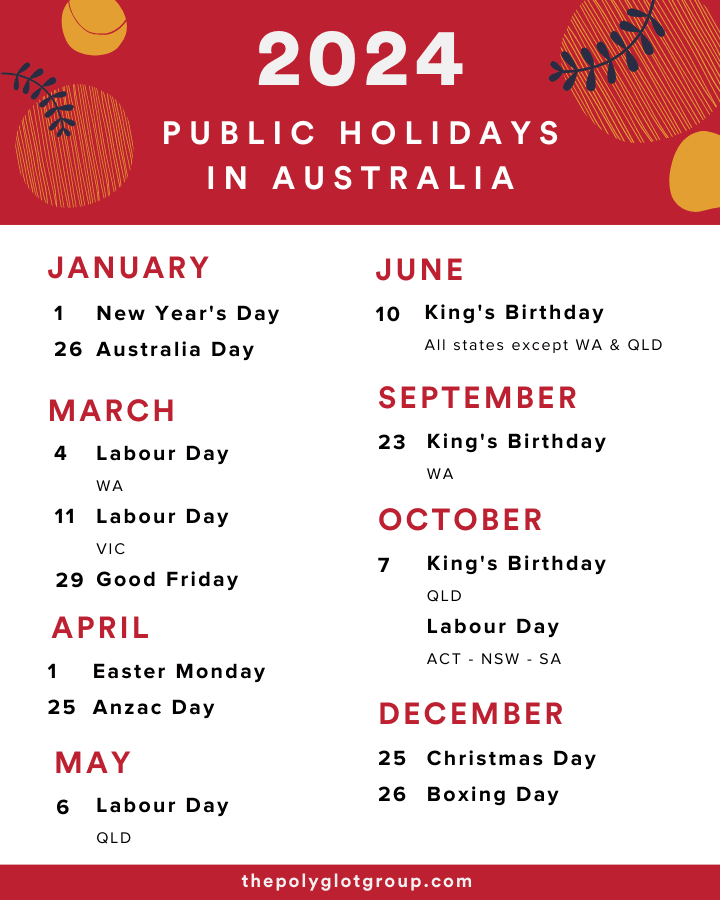In Australia, there are 8 national public holidays observed as part of the National Employment Standards (NES) that underpin employment throughout the country.
In addition to these key dates, some states and territories also have additional regional public holidays or substitute public holidays. Substitute public holidays mean that if a public holiday falls on a Saturday or Sunday it may be that the following Monday is declared a public holiday.
Given that Australia is composed of 7 states & territories with their unique local holidays, as well as the fact that some national public holidays fall on different dates depending on the location, this can easily lead to confusion for foreign businesses, particularly if they have offices across different states or territories.
For ease, we’ve summarised all 2024 national public holidays below, whether they’re celebrated on the same day throughout the country, or on different dates depending on the state or territory. Should you wish to keep up with state-specific public holidays, we recommend heading here.
January
1 January | Monday | New Year’s Day
Similarly to many other countries around the world, New Year’s Day is a public holiday right across Australia.
26 January | Friday | Australia Day
Australia Day as a concept has been around for 85 years, but was only declared a national public holiday in 1994. Before 1935, Australia Day was celebrated by the states and territories on different days.
The Monday nearest to January 26 became the Australia Day holiday after years of petitioning for a national long weekend holiday by the Australian Natives’ Association. The association chose January 26th because it was the day Captain Arthur Phillip raised the Union Jack flag in Sydney Cove, officially beginning British colonisation. It wasn’t until 1994 that Australia Day was declared a public holiday celebration on January 26th, rather than the nearest Monday.
While some see January 26 as the birth date of Australia as we now know it, others who are sympathetic to the brutal effects of colonisation on Aboriginal people see it as a day of mourning. Whilst some have petitioned to change the date out of respect, it remains a National public holiday throughout the country.
March
29 March | Friday | Good Friday
Although Australia is the land of many cultures and religions, Catholic holidays continue to hold great significance. As such, Good Friday marks the day that Jesus Christ was buried.
April
1 April | Monday | Easter Monday
The Easter weekend is a family holiday that falls during the school holidays.
It is generally a time for chocolate with Easter egg hunts and family lunches, complete with roasted lamb.
25 April | Thursday | Anzac Day
Standing for “Australia and New Zealand Army Corps”, Anzac Day is probably Australia’s most important national day as it marks the anniversary of the first campaign that led to major casualties for Australian and New Zealand forces during World War One and commemorates all the conflicts that followed.
December
25 December | Wednesday | Christmas Day
Similarly to many countries across the globe, Christmas Day is a holiday right across Australia. On this day, you’ll most likely find often find people having a barbie (short for BBQ in “Australian”) on the day.
26 December | Thursday | Boxing Day
In Australia, Boxing Day always occurs the day after Christmas. The name “Boxing” comes from the custom, back in the 19th Century, when the wealthy used to box up gifts to give to those less fortunate.
Having now outlined all “same day” National Holidays throughout Australia, let’s take a look at those that are commemorated on different dates. These are individually declared by the state and territory governments:
Labour day
Originally called “Eight Hours Day”, Labour Day commemorates the achievements of the Australian labour movement. The celebration of Labour Day has its origins in the eight-hour day movement, which advocated eight hours for work, eight hours for recreation, and eight hours for rest. It falls on the following dates depending on the state:
– March 4: Western Australia
– March 11: Victoria
– May 6: Queensland
– October 7: Australian Capital Territory, New South Wales, South Australia
King's Birthday
Australia celebrates this holiday because it is a member of the Commonwealth of Nations, with the English monarch as head of state. This is currently King Charles III. He is also the head of state of many other countries and territories, including Great Britain, Northern Ireland, Canada and New Zealand.
He was born on November 14, 1948, although his official birthday is celebrated on a range of dates in the different countries of the Commonwealth. Originally, the Monarch’s birthday was celebrated on the anniversary of the actual date of birth of the King or Queen. However, after the death of King George V in 1936, the date remained close to his birthday, which was June 3.
In Australia, the King’s birthday is observed on the second Monday in June, except in Western Australia and Queensland.
– June 10: All states except Western Australia & Queensland
– September 23: Western Australia
– October 7: Queensland
Each country celebrates its distinct public holidays, so making sure to keep up with your local employer’s obligations is paramount to ensure compliance. To get a better understanding of your obligations as well as your employees’ rights in Australia, head to FairWork.













 January 10, 2024
January 10, 2024 








